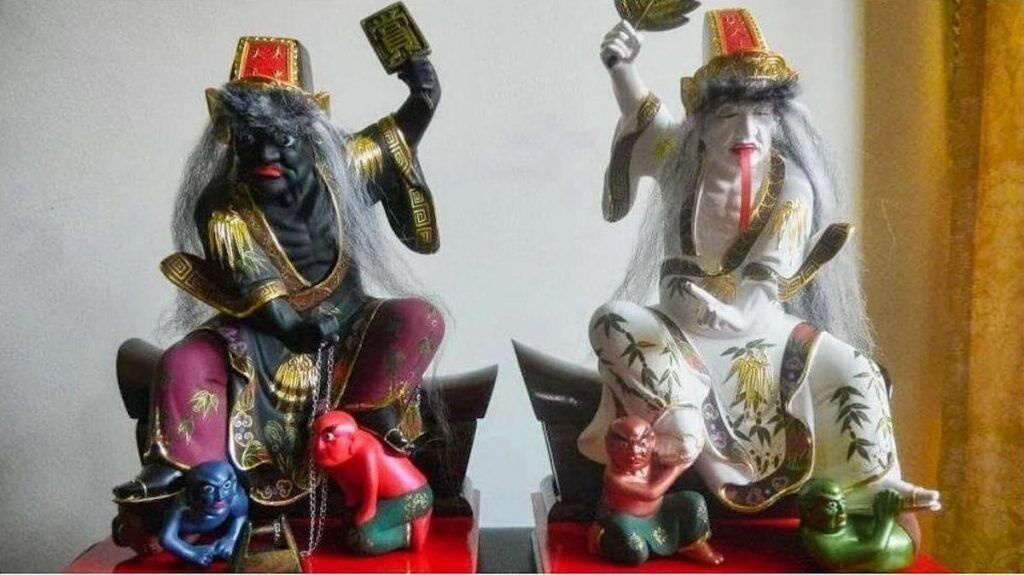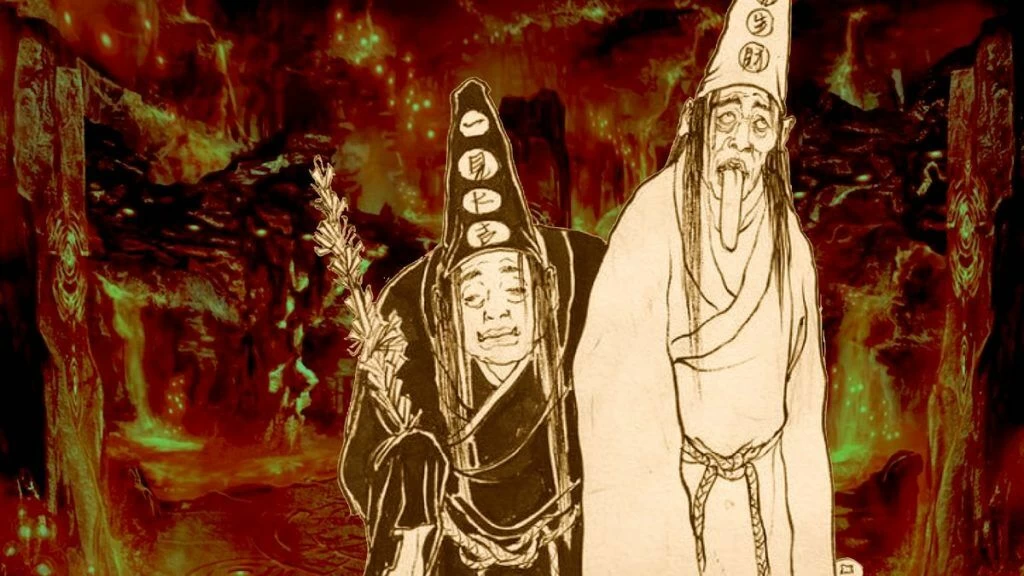There is a legend so old, perhaps older than some of the oldest Chinese dynasties. Even in the days of the First Emperor of China, there was a vivid belief in an afterworld. However, the dead needed an escort who could help with the journey into the next life. The Heibai Wuchang, the ‘Black Guard’ and the ‘White Guard’ of the underworld, appear at the deathbeds of the recently deceased to guide their souls to the realm of the dead. Even today, people around the world worship these Chinese Grim Reapers and consider them an important part of Chinese religion.

The Myth of the Heibai Wuchang
The following is just one version of the legend of the Chinese Grim Reapers.
Long ago in ancient China, two constables, Xie Bi An and Fan Wu Jiu, were tasked with escorting a prisoner from one city to another. Halfway through the journey, however, the prisoner had managed to escape into the vast Chinese wilderness catching both guards by surprise as he leaped into the forest.
The Chinese wilderness was untamed. This was more so at night, as wild beasts and unnatural beings roamed the countryside hunting for their next prey. Nonetheless, Xie Bi An and Fan Wu Jiu decided to split up and search for the prisoner. They agreed they would meet up under an old and exquisite bridge when the sun was about to set, regardless of whether or not either of them had found the missing prisoner.
After a few hours, there were no footprints in sight. As the sun was about to set, Xie Bi An decided it was best for him to arrive earlier. Waiting underneath the old bridge as he had promised, the constable stayed alert in case he saw the missing prisoner or needed to ward off wild animals or evil spirits. However, torrential rain started pouring down. Fan Wu Jiu, who was just nearby, quickly made a detour due to heavy mudslides and flooding.
Was the Great Flood of China Really Just a Myth?
Eventually, Fan Wu Jiu staggered across the heavy weather into the underbelly of the old bridge. But when he reached the edge of the bridge, he was aghast to see his friend’s body floating downstream. The bridge had flooded, and Xie Bi An was caught in between the sturdy old bridge and violent water. Devastated, Fan Wu Jiu hung himself right at the edge of the bridge where he was standing.
The Jade Emperor, a supreme god who saw their act of loyalty toward each other, decided that he would reward them by reincarnating them as generals of the underworld, a place Chinese call Diyu. This is how the famous spirits known as Heibai Wuchang came to be.
Characteristics of the Diyu Guards
[blockquote align=”none” author=”Nituo”]The Chinese underworld, called ‘Diyu’ is a complex system of underground chambers and tunnels with ten different levels – each punishing a different sin made by the soul when he/she was alive.[/blockquote]
Literally translating as ‘black and white impermanence,’ the Heibai Wuchang function something like the Grim Reaper that we are familiar with in the West. But the natures of these eternal guards of Diyu are more unpredictable. They can be benevolent and may grant riches and winning lottery numbers for those of virtue. On the other hand, they can be nightmarish, doling out torturous punishments for those who have led an unsavory life.

As Xie Bi An, or White Guard, died from drowning, his tongue became extended as he gasped for air during his last moments alive. His face is also white and he wears a white robe and tall hat. In one hand he holds a fan and in the other a sign or shackle.
Fan Wu Jiu’s face became black due to his death from hanging. He too carries a fan and a sign that says something to the effect of “Rewarding the good and punishing the evil.” Both are armed with chains and cuffs.
Duties in the Netherworld
Although they are among the lowest deities in the hierarchy of Diyu, they assume a huge responsibility as guardians and wardens. They patrol the streets nightly for the drifting spirits of those who’ve recently died. Dressed in black, the apathetic reaper demands cooperation, while the other, draped in pure white, empathetically comforts the confused soul.
However, Heibai Wuchang have additional duties. They must also maintain law and order within Diyu itself. To accomplish this, they must punish and torture evil spirits for the sins they committed in life. Some of their punishments include tongue pulling, ear pulling, and in more extreme cases with very bad people, boiling.
Summoning the Guardians of Hell
A common practice among several Chinese communities across the world is invited possessions. These possession rituals are common during the end of the Chinese New Year or on the birthday of the gods – also called Ji Tong.
The Lavish Tomb of the First Emperor of China
During the practice, mediums dress up in traditional deity attire and consume a concoction (this depends on the region or temple) before entering into a trance-like state. At this time, the mediums allow a specific deity to take over their bodies by relinquishing the urge to resist control. Once in full control, the deity consults people in need or perform rituals.
Most commonly, worshippers summon Heibai Wuchang over other deities due to the promise of immense wealth and the moral wisdom they command.
Are the Heibai Wuchang Good or Bad?
There are many stories associated with both Chinese guardians of the afterworld. Many priests and devotees often view the Black Guard, Fan Wu Jiu, as morally ambiguous. Some people reported that they saw him patronizing opium dens, gambling, and engaging with prostitutes in the 1930s. Others say this was his behavior before he became the Black Guard.
In fact, certain Chinese communities view Heibai Wuchang as unorthodox or unpleasant deities to worship. However, the myth behind the Hell Guards has helped many criminals and gangsters give up their lives of crime. This rehabilitative effect is heightened especially when temples hold Ji Tong ceremonies during which many devotees consult the spirits about how they can live a morally conscious life. Many immoral or unlawful people have claimed that these deities helped turn their lives around.
Good Deeds of the Guards
More god than ghosts, these spirits, unlike many others, try to help those in need. An interesting account from China depicts how the husband of a lady with smallpox cheated her out of all her money. As a selfish, greedy man, he married her only for her father’s wealth. She gave birth to two children while her husband involved himself in sensual pleasures using his wife’s wealth.
Eventually, her husband started gambling. Because he never had the money to pay his debts, collectors would come to her house and threaten her. In despair, the woman thought her only option was suicide. The White Guard, Xie Bi An, stopped her just in time. Then he convinced her that if she took her own life, there would be no one who could raise the children. Legend has it that Xie Bi An faked her death by burning down all her wealth and property. She subsequently escaped with her children to a new life while punishing her husband for his sins.
The influence of the Heibai Wuchang on the morality of worshippers reflects their strong foothold in Chinese culture. In fact, many Chinese children are often taught not to cover their blankets over their faces because it is a sign of death in the Chinese tradition. If the Guards of Diyu mistake them as dead, they might take their souls away. This does seem to provide parents with some parenting support. After all, like Baba Yaga or Krampus, the Guards make the perfect bogeyman to frighten naughty children into obedience.
References:
-“Chinese Spirits and Deities of the Underworld” Nituo. June 11, 2019. Accessed July 23, 2019.
-Xie, Chiyu (1985). 閩南移民的信仰舊俗. Traditional Beliefs and Practices of Migrants from Fujian.